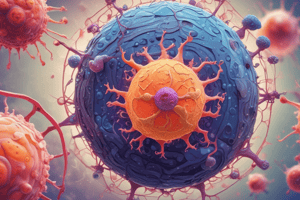Podcast
Questions and Answers
What is the mechanism involved in the clonal selection theory for producing antibodies?
What is the mechanism involved in the clonal selection theory for producing antibodies?
- Phagocytosis
- Antigen recognition
- Division and maturation
- All of the above (correct)
Who proposed the clonal selection theory?
Who proposed the clonal selection theory?
- Sarraj Al-Din Abdul Aziz Ahmed Sultan (correct)
- The text does not mention the proposer
- Unknown scientist
- Multiple scientists together
What does the clonal selection theory explain about the immune system?
What does the clonal selection theory explain about the immune system?
- It explains how the immune system recognizes antigens
- It explains how the immune system maintains its specificity
- Both a and b (correct)
- None of the above
What type of cells have genetic information to make a particular type of antibody according to the clonal selection theory?
What type of cells have genetic information to make a particular type of antibody according to the clonal selection theory?
What does each cell have as a receptor on its membrane according to the clonal selection theory?
What does each cell have as a receptor on its membrane according to the clonal selection theory?
Study Notes
Important Notice
- This summary is a guidance and a supplement to the lectures, in addition to the previously mentioned sources.
- It is not permitted to publish this summary without a written permission from the publisher on any website or to print it at any library, to avoid legal issues.
Macrophages Development
- Monocytes in blood can differentiate into many different types of macrophages.
Phagocytosis
- Opsonization of a bacterium occurs through antibodies and complement.
- There are two types of phagocytosis:
- Type I phagocytosis: Ab receptor is called CD32.
- Type II phagocytosis: Complement receptor is called CD35.
Studying That Suits You
Use AI to generate personalized quizzes and flashcards to suit your learning preferences.
Description
This quiz covers the origin and development of macrophages, including the differentiation process from monocytes. It also provides supplementary information to lectures and previous sources, emphasizing the prohibition of unauthorized distribution or publication.



